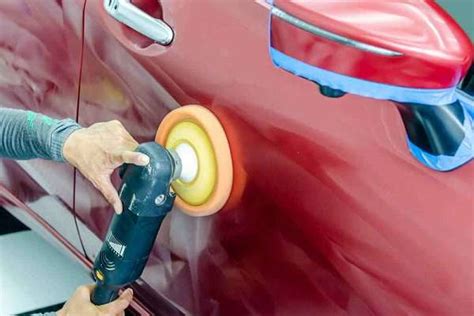How To Polish Single Stage Paint
Ronan Farrow
Apr 01, 2025 · 3 min read

Table of Contents
How to Polish Single Stage Paint: A Comprehensive Guide
Single-stage paint offers a sleek, factory-fresh look to your car, but maintaining its shine requires the right approach. This guide will walk you through the process of polishing single-stage paint to achieve a stunning, professional-level finish. We'll cover everything from choosing the right products to mastering the technique for achieving that perfect showroom shine.
Understanding Single-Stage Paint
Before diving into the polishing process, it's crucial to understand the unique characteristics of single-stage paint. Unlike clear coat paint, single-stage paint combines the color and clear coat in a single layer. This makes it more susceptible to scratches and swirl marks, requiring a gentler touch during polishing.
Why Polish Single-Stage Paint?
Polishing single-stage paint is essential for several reasons:
- Removing Scratches and Swirl Marks: Polishing helps to remove minor imperfections, restoring the paint's smooth surface.
- Enhancing Shine and Gloss: It reveals the underlying depth and richness of the color, bringing out the vibrancy of your car's paint.
- Protecting the Paint: A polished finish creates a smoother surface, making it easier to apply wax or sealant for added protection against the elements.
Essential Tools and Products
Gathering the right tools and products is critical for a successful polishing job. Don't skimp on quality; using inferior products can lead to more harm than good.
Must-Have Items:
- High-Quality Polishing Compound: Choose a compound specifically designed for single-stage paint. Look for a fine-cut compound that's gentle yet effective.
- Polishing Pad: Select a soft, foam polishing pad appropriate for your chosen compound. Different pads offer varying levels of aggressiveness.
- Dual-Action Polisher (DA Polisher): A DA polisher is highly recommended for its ability to prevent burn-through and achieve even results. Random orbital polishers are also a good option.
- Microfiber Towels: High-quality microfiber towels are crucial for removing the polish residue without leaving swirl marks. Multiple towels are recommended for optimal cleaning.
- Detailing Spray: A quick detailer or lubricant can help the polisher glide smoothly across the paint and minimize friction.
Step-by-Step Polishing Process
Now, let's get to the core of the process. Follow these steps carefully for best results:
1. Preparation is Key
- Wash and Dry Thoroughly: Start with a meticulous wash and dry. Remove any loose dirt, debris, or contaminants that could scratch the paint during polishing.
- Inspect for Damage: Carefully inspect the paint surface for deeper scratches or chips that may require more intensive repair before polishing.
2. Applying the Polish
- Small Sections: Work in small sections (2x2 feet) to ensure even application and avoid the polish drying out.
- Moderate Pressure: Apply moderate pressure with the DA polisher, allowing it to do the work. Avoid excessive pressure, which can cause burn-through.
- Overlapping Passes: Overlap your passes to ensure complete coverage and prevent any missed spots.
3. Buffing and Removal
- Microfiber Towels: Use clean microfiber towels to remove the polish residue. Work in straight lines, avoiding circular motions, which can introduce new swirl marks.
- Multiple Towels: Use multiple clean towels to avoid spreading the polish residue.
4. Final Inspection and Touch-Ups
- Visual Inspection: After polishing, thoroughly inspect the paint for any remaining imperfections. Address any missed spots or remaining swirl marks with a lighter touch.
Maintaining Your Polished Finish
Preserving your hard work is just as important as achieving it. Here are some tips:
- Regular Washing: Regularly wash your car using a two-bucket method to minimize scratching.
- Wax or Sealant: Apply a high-quality wax or sealant to protect the polish and enhance the shine.
- Avoid Harsh Chemicals: Avoid using harsh chemicals or abrasive cleaners that could damage the paint.
By following these steps and using the right tools and techniques, you can achieve a stunning, professional-level polish on your single-stage paint, protecting your investment and keeping your car looking its best. Remember, practice makes perfect! Don't be afraid to experiment and refine your technique to achieve the perfect shine.
Featured Posts
Also read the following articles
| Article Title | Date |
|---|---|
| How To Increase Amh Levels Naturally | Apr 01, 2025 |
| How To Paint Synthetic Rifle Stock | Apr 01, 2025 |
| How To Make Office Smell Good | Apr 01, 2025 |
| How To Make Vatana Curry | Apr 01, 2025 |
| How To Make My Own Condom | Apr 01, 2025 |
Latest Posts
Thank you for visiting our website which covers about How To Polish Single Stage Paint . We hope the information provided has been useful to you. Feel free to contact us if you have any questions or need further assistance. See you next time and don't miss to bookmark.
